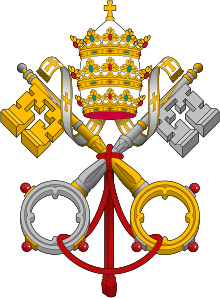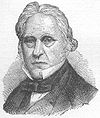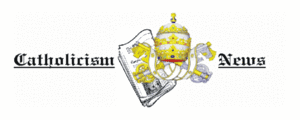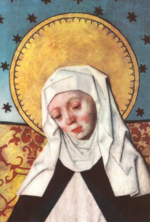
Back بوابة:الكنيسة الرومانية الكاثوليكية Arabic Уикипедия:Светци Bulgarian Portalo:Katolika Eklezio Esperanto Portal:Iglesia católica Spanish Portail:Catholicisme French Portál:Katolicizmus Hungarian Portale:Cattolicesimo Italian Portal:Katolik Malay Portal:Den katolske kirke NB Portal:Katolicyzm Polish
Introduction The Catholic Church, also known as the Roman Catholic Church, is the largest Christian church, with 1.28 to 1.39 billion baptized Catholics worldwide as of 2024. It is among the world's oldest and largest international institutions and has played a prominent role in the history and development of Western civilization. The church consists of 24 sui iuris churches, including the Latin Church and 23 Eastern Catholic Churches, which comprise almost 3,500 dioceses and eparchies located around the world. The pope, who is the bishop of Rome, is the chief pastor of the church. The Diocese of Rome, known as the Holy See, is the central governing authority of the church. The administrative body of the Holy See, the Roman Curia, has its principal offices in Vatican City, a small independent city-state and enclave within the Italian capital city of Rome, of which the pope is head of state. The core beliefs of Catholicism are found in the Nicene Creed. The Catholic Church teaches that it is the one, holy, catholic and apostolic church founded by Jesus Christ in his Great Commission, that its bishops are the successors of Christ's apostles, and that the pope is the successor to Saint Peter, upon whom primacy was conferred by Jesus Christ. It maintains that it practises the original Christian faith taught by the apostles, preserving the faith infallibly through scripture and sacred tradition as authentically interpreted through the magisterium of the church. The Roman Rite and others of the Latin Church, the Eastern Catholic liturgies, and institutes such as mendicant orders, enclosed monastic orders and third orders reflect a variety of theological and spiritual emphases in the church. Of its seven sacraments, the Eucharist is the principal one, celebrated liturgically in the Mass. The church teaches that through consecration by a priest, the sacrificial bread and wine become the body and blood of Christ. The Virgin Mary is venerated as the Perpetual Virgin, Mother of God, and Queen of Heaven; she is honoured in dogmas and devotions. Catholic social teaching emphasizes voluntary support for the sick, the poor, and the afflicted through the corporal and spiritual works of mercy. The Catholic Church operates tens of thousands of Catholic schools, universities and colleges, hospitals, and orphanages around the world, and is the largest non-government provider of education and health care in the world. Among its other social services are numerous charitable and humanitarian organizations. (Full article...) Selected article
 Gregorian chant is the central tradition of Western plainchant, a form of monophonic, unaccompanied sacred song of the western Christian Church. Although it had mostly fallen into disuse after the 1600s, it experienced a revival in the 19th Century in the Roman Catholic Church and the Anglo-Catholic wing of the Anglican Communion. Gregorian chant was organized, codified, and notated mainly in the Frankish lands of western and central Europe during the 9th and 10th centuries, with later additions and redactions, but the texts and many of the melodies have antecedents going back several centuries earlier. Although popular legend credits Pope Gregory the Great with inventing Gregorian chant, scholars believe that the chant bearing his name arose from a later Carolingian synthesis of Roman and Gallican chant.Gregorian chants are organized into eight scalar modes.
Selected image
 Credit: Stanislav Traykov
The Pietà (pl. same; Italian for pity) is a subject in Christian art depicting the Virgin Mary cradling the dead body of Jesus, most often found in sculpture. As such, it is a particular form of the devotional theme of Our Lady of Sorrows, and also a scene from the Passion of Christ. Selected biography
 Charles II was the King of England, Scotland and Ireland from 30 January 1649 until his death. Charles II's father, Charles I, had been executed in 1649 following the English Civil War; the monarchy was then abolished and replaced with a military dictatorship under Oliver Cromwell, who had named himself "Lord Protector". In 1660, shortly after Cromwell's death, the monarchy was restored under Charles II. Unlike his father, Charles II was skilled at managing Parliament. It was during his reign that the Whig and Tory political parties developed. He famously fathered numerous illegitimate children, of whom he acknowledged fourteen. Known as the "Merry Monarch", Charles was a patron of the arts and less restrictive than many of his predecessors. By converting to Roman Catholicism on his deathbed, Charles II became the first Roman Catholic to reign over England since Mary I's death in 1558.
Did you know...
Related portalsFeast Day of July 23
Selected quote

News
SubcategoriesTopics
The Holy Bible:
Particular Churches (grouped by liturgical rite):
Things you can do
External resourcesWikiProjectsAssociated WikimediaThe following Wikimedia Foundation sister projects provide more on this subject:
Discover Wikipedia using portals |
© MMXXIII Rich X Search. We shall prevail. All rights reserved. Rich X Search

































